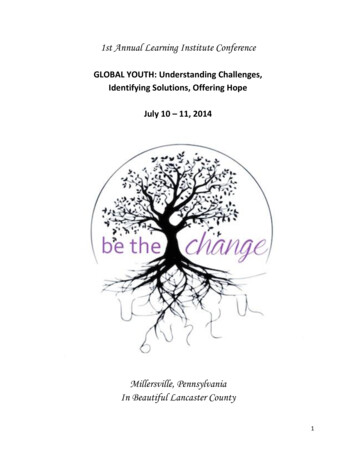
Transcription
1st Annual Learning Institute ConferenceGLOBAL YOUTH: Understanding Challenges,Identifying Solutions, Offering HopeJuly 10 – 11, 2014Millersville, PennsylvaniaIn Beautiful Lancaster County1
Welcome to the1st Annual Learning Institute ConferenceGLOBAL YOUTH: Understanding Challenges,Identifying Solutions, Offering HopeJuly 10-11, 2014Millersville, PennsylvaniaHosted byMillersville UniversityDepartment of Social WorkEnjoy the conference and your stay in scenic, historic,Lancaster County, Pennsylvania!2
Learning Institute CommitteeMillersville UniversityDepartment of Social WorkDr. Karen Rice:Assistant Professor, Department Chair &Learning Institute Co-CoordinatorDr. Joyous Bethel:Assistant ProfessorMs. Kristin Callaway:Graduate AssistantMs. Beth Colvin:MSW SecretaryMs. Lauren Corso:Graduate AssistantDr. Marc Felizzi:Assistant ProfessorDr. Leonora Foels:Assistant Professor & Learning Institute Co-CoordinatorProf. Jennifer Frank:Instructor & BSW/MSW Field CoordinatorDr. Heather Girvin:Assistant Professor & MSW Co-CoordinatorDr. Laura Granruth:Assistant ProfessorDr. David Johnson:Assistant ProfessorMs. Kathy Kuhns:BSW SecretaryMs. Lenisse SantiagoGraduate assistantDr. Kathleen Walsh:Associate Professor & BSW Coordinator3
General InformationParking:Parking will be available at the Prince Street Garage on 111 N. Prince St, Lancaster, PA 17603.Upon entering the garage you will receive an entrance parking ticket. An exit ticket will beprovided to attendees at the registration table. This will allow you to stay parked in the garagefree of charge. You will need both tickets to exit garage.For Wi-Fi Access:Connect to the “MUguest” networkBoth the username and password is “guest”ATM Machine:ATM machine will be located at the front of the Ware Center Lobby. The ATM offers 24-houraccessibility and will accept deposits to any bank that is a part of the Cirrus System.Police/Emergency Information:Address: 39 W Chestnut St, Lancaster, PA 17603Phone: (717) 735-330024-Hour Emergency Services:Lebanon House237 N. George St.Millersville, PA 175518:00 am-4:30 pmEmergency: 911Non-Emergency: (717) 872-34334
PROGRAM AT A GLANCEThursday July 10, elcome andOpening Remarks9:15- 10:00KeynoteSession 1Contact Hours: 110:15-11:15Session 2Contact Hours: 111:30-12:30Session 3Contact Hours: 1WorkshopsWorkshopsWorkshopsWorkshopsRoom: Ware Center, LobbyPresenter: Dr. Karen RiceRoom: AtriumTitle: Youth: Challenges They Face TodayPresenter: Sergio Argueta, MSWRoom: AtriumTitle: Mental WellBeing and DecisionMaking in the FosterCare SystemTitle: Service Learningand CommunityEngagementTitle: Teens, Sex andthe Internet: SexualDevelopment in theDigital AgeTitle: Kijana (Youth)Exploring HIP HOPCulture in HealingPresenter: Julie E.Bertram, MSN,InstructorPresenter: DinaRosenfeld, LCSW,DSWPresenter: Presenters:Jennifer Weeks, PhD,LPC, CAACD, CSAT andJessica Gwin, MFT,MSWPresenter: Richard M.Cooper, ClinicalAssistant ProfessorRoom: 304Title: Injustice for All:The Prosecution of 16Year Olds as Adults inCriminal CourtPresenter: CarlMazza, DSW, LMSW;Darryl Briggs,Undergraduate SocialWork Student,Lehman College of theCity University of NewYork; & JasonMachicote,UndergraduatePolitical ScienceStudent, LehmanCollege of the CityUniversity of New YorkRoom: 305Title: Big, Black,Teenaged Queens:NavigatingIntersections andCombating ‘No FatsNo Femmes’PhenomenonPresenter: Edward D.Scott, Jr.Room: 308Title: We Speak Art:Facilitating GroupWork through Clay andPaintPresenter: JenniferClements, PhD, LCSWRoom: 314Title: Mental HealthProfessionals as ExpertWitnesses: EffectiveTestimony about YoungDefendants' ADHDPresenter: OrlyCalderon, Psy.d andJessica Elkin, MSRoom: 304Room: 305Room: 308Room: 3145
12:30-2:002:00-3:00Session 4Contact Hours: 13:15-4:15Session 5Contact Hours: 1Lunch on your OwnTitle: RethinkingBoundaries: MaleSocial Workers and'Fatherless' YoungUrban MalesPresenter: CarlMazza, DSW, LMSW;Joseph TwumasiAnkrah, LMSW; &Derwin Greene, MSWCandidate,Kingsbridge HeightsCommunityCenter/LehmanCollegeRoom: 304Title: Lessons fromJapan's foodeducation:Implications forchildren's health inthe USPresenter: SachiAndo, PhD, MSSWRoom: 304Title: Impact of StateTax CodeProgressivity onChildren's Health andEducation OutcomesPresenter: LauraBrierton Granruth,PhD, MSWTitle: Youth Power: Acase study on trainingyouth organizersPresenter: BonnieYoung-Laing, PhD;Gwendolyn PerryBurney, PhD; & BrianBrown, Communityand Youth OrganizerTitle: OMG,Chillax NegotiatingEthical Practice withAdolescents (Part 1)Presenter: KathleenWalsh, PhD & JenniferClements, PhD, LCSWRoom: 305Room: 314Room: 308Title: Spoken WordPoetry & Hip Hop asUrban YouthDevelopment ToolPresenter: JeremyRaff, The Mix at ArborPlace, Director ofPrograms & Ty Grant,The Mix at ArborPlace, We Rock theMic FacilitatorTitle: OMG, Chillax Negotiating Ethical Practicewith Adolescents (Part 2 ends at 5pm)Presenter: Kathleen Walsh, PhD & JenniferClements, PhD, LCSWRoom: 305Room: 3086
Friday, July 11, 2014TimeWorkshops8:00-10:00ConferenceRoom: Ware Center, LobbyRegistration9:00-10:00Title: AvediumProgramPresentationSession 6ContactHours: 110:15-11:15Session 7ContactHours: 111:30-12:30Session 8ContactHours: 112:30-2:00WorkshopsWorkshopsTitle: Emotional Abuse,Parent/Caregiver Instabilityand Disrupted Attachment:The Possible Relationship toJuvenile Sex Offending StatusPresenter: Marc Felizzi, PhDTitle: Bullying: Understanding,Assessing, and PreventingPresenter: Solomon Hill, PhD;Karen Rice, PhD, LSW, ACSW;& Leonora E. Foels, PhD,LCSW, LICSWTitle: Religious and CulturalTolerance in Northern IrishParticipants Effectiveness of theUlster Project Delaware: 19762011Presenter: Eileen Starr, LCSW-C,LCSWRoom: 304Title: Assessing Outcomes ofUnaccompanied RefugeeMinors: An Exploratory PilotStudyPresenter: Morgan Pardue,Lutheran Immigrant andRefugee Service & Kerri Socha,Lutheran Immigrant andRefugee ServiceRoom: 305Title: Gender Differences inCollege Student Leaders inSeeking ProfessionalPsychological TreatmentPresenter: Racherl Gimber,Alvernia University; KellieAnne O’Donnell, AlverniaUniversity; & Sean Hart,Alvernia UniversityRoom: 308Title: Through Their Eyes: UsingPhoto-elicitation to ExploreBullying and Promote ChangePresenter: Karen Rice, PhD, LSW,ACSW & Heather Girvin, PhD, MSS,Millersville UniversityRoom: 304Room: 305Room: 308Room: AtriumLunch on your OwnLancaster Marriott atPenn Square7
Time2:00-3:00Session 9ContactHours: 13:15-4:15Session 10ContactHours: 1WorkshopsTitle: Global KidsOrganizing in theGlobal City: GeneratingSocial Capital inImmigrant YouthPresenter: SofiaOviedo, MPA &Anthony De Jesus, EdD,MSWWorkshopsTitle: SexualAssault 101 andAnti-Oppression:Engaging youth inprevention ofsexual violencePresenter: NickMiron, YWCALancaster, Racialand Genderequality Advocate& Lisa White,YWCA Lancaster,Director ofCounseling andEmpowermentSeriesWorkshopsTitle: A Matter ofHOPE: CaseManagement as anIntervention Strategyfor Families and YouthImpacted by ParentalIncarcerationPresenter: SheridanQuarless Kingsberry,PhD, MSW; SachinKarnick, PhD, LCSW,CPS; & Natalie MFountain, BARoom: 304Title: Hope amongundocumentedimmigrant youth infoster care:Implications foradvocacyPresenter: JayshreeJani, PhD & MarcelaSarmiento Mellinger,PhDRoom: 305Room: 308Title: Issues, Approaches& Practices for aGeneration of VirtuallyConnected Youth in Outof-Home CarePresenter: Rob Edwards,MSW, LGSW, APSWRoom: 304Room: 305WorkshopsTitle: The Resilience ofUrban Black Teen GirlsWho Grieve MurderedFriendsPresenter: Celeste MJohnson, PhD, LCSWRoom: 3148
INSTITUTE PROGRAMDetailed Descriptions of Concurrent PresentationsSESSION 1THURSDAY, JULY 10, 9:15AM-10:00AMKeynoteSESSION 1ATITLE: Youth: Challenges They Face TodayPRESENTER: Sergio Argueta, MSW, BSW Program Director Adelphia UniversityAbstract: Today’s youth face challenges reminiscent of yesterday’s youth, including poverty, violence,and substance abuse. However, how youth are viewed and treated has changed over time and hascontributed to an increase in youth violence, addiction, teen pregnancy, and homelessness, to name afew. Youth today are faced with inadequate opportunities for education and training, inequities inafterschool programs and activities, and increased discrimination based on gender and sexualorientation. These challenges are not restricted to any one ethnic or religious group. Young peopleeverywhere have future aspirations but require an inclusive, supportive society that encourages theirhopes, visions, and dreams. For this reason, the United Nations has long recognized the need forsocieties to support the energies of their youth to ensure ongoing societal development.Learning Objectives: Participant will: Gain an understanding of challenges that face youth on a local and global level Understand environmental factors that impact young adults Acquire skills that can be used across multiple levels and professions to bring about positivechangeSESSION 2THURSDAY, JULY 10, 10:15AM-11:15AMSESSION 2ATITLE: Mental Well-Being and Decision-Making in the Foster Care SystemPRESENTERS: Julie E. Bertram, MSN, Instructor, School of Nursing St. Louis UniversityAbstract: This study seeks to understand decision-making in the foster care system and it builds itself onprevious experience in the foster care system. The concerns surrounding mental health care in the childwelfare system merit investigation of decision-making processes to assist in improvement of quality oflife for foster youth with mental health needs, foster parents, and case managers (Alavi & Calleja, 2012;Costello, 2002; McMillen et al., 2007; Raghavan, Inkelas, Frank & Halfon, 2007; Shireman, 2009). My9
study will explore and describe current practices because little is known about how decision-makinghappens or how stakeholders feel about it. It also examines the issue of empowerment.Learning Objectives: At the end of this session, participants will be able to:1. Provide various definitions of mental well-being2. Articulate the concerns of foster youth, foster parents and case managers aboutdecision-making in the foster care system.3. Describe characteristics of shared decision-making as it applies to mental health care.SESSION 2BTITLE: Service Learning and Community EngagementPRESENTERS: Dina Rosenfeld, LCSW, DSW, NYU School of Social WorkAbstract: Service learning is a method of learning and teaching, which integrates community service,academic content and reflection. As a form of experiential education, service learning provides theopportunity for students to apply the theoretical content acquired in the classroom to help solveproblems in the community. New York City is an especially rich laboratory for this endeavor. For collegeyouth, leadership development, an important goal of liberal education studies may be fostered andevidenced through participation in higher education service learning courses/activities. Silver hasdeveloped several courses in partnership with community agencies. Our focus has been with agenciesserving immigrant community: University Settlement House services the Chinese immigrant community;Self-help, elderly immigrant Holocaust survivors and IRC, adolescents from war torn countries.Learning Objectives:1. How to teach students the values inherent in volunteerism and civic engagement.2. Highlight the importance of diversity, immigration status, culture, race, gender andsocioeconomic factors in volunteering3. Assessing the needs of a community in both micro and macro perspectives.4. How to teach critical reflection within the service experience.5. Teaching and learning the interplay between theoretical understanding of social-environmentalforces and how to apply them to volunteering.SESSION 2CTITLE: Teens, Sex and the Internet: Sexual Development in the Digital AgePRESENTERS: Jennifer Weeks, PhD, LPC, CAACD, CSAT and Jessica Gwin, MFT, MSWAbstract: The internet is a valuable tool for connection; however it provides unfettered access tocybersex. This exposure affects sexual development. Problems arousal addiction, arousal templatecreation and pornography induced erectile dysfunction. This workshop will focus on how youth use theinternet for sexual purposes, effects of exposure, and treatment options.10
Learning Objectives:1. Identify specific ways in which youth use the internet for sexual purposes.2. Identify specific ways this affects sexual development and relational problems3. Identify specific ways that families can intervene and tools that can be used to treat problematiccybersex.SESSION 2DTITLE: Kijana (Youth) Exploring HIP HOP Culture in HealingPRESENTERS: Richard M. Cooper, Clinical Assistant ProfessorAbstract: The presenter applies the utilization of Hip Hop culture and the African centered concept ofNommo for use with urban adolescents. Participants will take part in a highly interactive and livelylearning workshop that constructs narratives to work with African American male adolescents.Learning Objectives:1. Participants will learn tenets of Hip Hop Culture from cultural, adolescent, and corporateworldviews and begin to apply the frameworks of therapeutic realms.2. Participants will be able to apply Nommo to their direct practice work with African Americanadolescents.3. Participants will become more familiar with Black youth popular culture and further diminishthe notions of “at-risk and resistant clients” in clinical practice settings.SESSION 3THURSDAY, JULY 10, 11:30AM-12:30PMSESSION 3ATITLE: Injustice for All: The Prosecution of 16 Year Olds as Adults in Criminal CourtPRESENTERS: Carl Mazza, DSW, LMSW; Darryl Briggs, Undergraduate Social Work Student, LehmanCollege of the City University of New York; & Jason Machicote, Undergraduate Political Science Student,Lehman College of the City University of New YorkAbstract: Research into brain development has determined that adolescents are still children. Fordecades in the U.S. states have prosecuted and sentenced 16-year olds as adults. Recently, there hasbeen a growing movement to raise the age of prosecution of adolescents. What are the emotional,psychological, and societal consequences of the prosecution of 16-year olds?Learning Objectives:1. Participants will learn the public welfare history of how the prosecution of 16-year olds as adultsbecame a “popular” movement in the United States.2. Participants will become familiar with some of the research done on the adolescent brain and itsfunctioning.11
3. Participants will recognize some of the emotional and psychological consequences ofincarcerating adolescents in adult facilities.4. Participants will understand some of the societal ramifications of incarcerating adolescents inadult prisons.SESSION 3BTITLE: Big, Black, Teenaged Queens: Navigating Intersections and Combating ‘No Fats-No Femmes’PhenomenonPRESENTERS: Edward D. Scott, Jr. School of Social Policy and Practice University of PennsylvaniaAbstract: Literature largely suggests that ethnicity impacts how individuals engage sexuality,gender presentation, and body image as independent issues. This project explores intragroupoppression and the multidimensional negative impact of ‘No Fats, No Femmes’ phenomenon onqueer adolescents of color who face increasing oppression with each intersection of their identities.Learning Objectives:1. To further recognize the complexities surrounding intersectional identities within a specificcontext of intragroup oppression.2. To promote an increased awareness and understanding of the “No Fats, No Femmes”phenomenon within the GBQ community3. To articulate how ethnic differences impact queer adolescents’ development4. To illustrate the ways that queer youth who hold memberships to multiple oppressed groupsare impacted by their memberships, navigate interpersonal relationships, and reconcile withtheir GBQ identities.SESSION 3CTITLE: We Speak Art: Facilitating Group Work through Clay and PaintPRESENTERS: Jennifer Clements, PhD, LCSWAbstract: This presentation will illustrate a group that used paint and clay as a common language. In aschool in Rwanda, group work was facilitated with the children. The process of using this type ofmodality will be shared as well as picture of the work and recommendations for practice.Learning Objectives:1. Participants will learn about the theory of using of paint and art in a group setting.2. Participants will learn about the creative strategies and process implemented in the group.3. Participants will observe and examine the visual representations created by the children inRwanda.12
SESSION 3DTITLE: Mental Health Professionals as Expert Witnesses: Effective Testimony about Young Defendants'ADHDPRESENTERS: Orly Calderon, Psy.d and Jessica Elkin, MSAbstract: This workshop presents strategies for effective expert testimony about young defendants'diagnosis of ADHD in the context of the mental health and the criminal justice system. Suggestedstrategies are based on data analysis of relevant court decisions. Best-practice skills are modeled andfollowed by role-play exercises.Learning Objectives:1. Describe the link between ADHD and criminal behavior in youths.2. Identify the potential impact of the ADHD on young defendants’ functioning during the variousphases of the adjudicative process3. Develop strategies for effective testimony that addresses the link between ADHD and relevantlegal standards.SESSION 4THURSDAY, JULY 10, 2:00PM-3:00PMSESSION 4ATITLE: Rethinking Boundaries: Male Social Workers and 'Fatherless' Young Urban MalesPRESENTERS: Carl Mazza, DSW, LMSW; Joseph Twumasi-Ankrah, LMSW; & Derwin Greene, MSWCandidate Kingsbridge Heights Community Center/Lehman CollegeAbstract: Many young men in single parent families grow up in an environment void of a consistentpositive male role smodel. When the social worker is male, he often becomes the most influential malein the adolescents' lives. While this provides strong opportunities to develop therapeutic relationships,especially with at-risk youth, it raises issues such as boundaries, transference and counter-transference.Learning Objectives:1. Participants will better understand the significance male social workers often play in the lives ofat-risk urban male youth.2. Participants will become aware of the emotional void that is often felt within at-risk urban maleyouth.3. Participants will become cognizant of dilemmas often confronted by male social workersregarding boundaries with at-risk urban male youth.4. Participants will recognize the complexity of concepts such as boundaries, including the fluidityof boundaries that exist at times in order to best meet the client’s needs.5. Participants will become aware of the dual relationships agencies often impose on male socialworkers working with at-risk urban male youth.13
SESSION 4BTITLE: Impact of State Tax Code Progressivity on Children's Health and Education OutcomesPRESENTERS: Laura Brierton Granruth, PhD, MSWAbstract: This secondary data analysis examined the impact of state tax-progressivity on children'shealth and educational outcomes. State tax-code progressivity is a predictor for state child and infantmortality rates, and for fourth- and eighth-grade academic proficiency. Specific attention is given toPennsylvania and neighboring states.Learning Objectives:1. Knowledge: At the end of this presentation participants will increase their knowledge of statetax policy.2. Affective: At the end of this presentation participants will better understand the impact of statetax policy structures on children’s health and education outcomes.3. Behavior: At the end of this presentation participants will be able to better advocate with statelegislators for more progressive state tax codes.SESSION 4CTITLE: Youth Power: A case study on training youth organizersPRESENTERS: Bonnie Young-Laing, PhD; Gwendolyn Perry-Burney, PhD; & Brian Brown, Community andYouth OrganizerAbstract: The workshop will describe a program in Pittsburg, P
Derwin Greene, MSW Candidate, Kingsbridge Heights Community Center/Lehman College Room: 304 Title: Impact of State Tax Code Progressivity on Children's Health and Education Outcomes Presenter: Laura Brierton Granruth, PhD, MSW Room: 305 Title: Youth Power: A case study on training youth organizers Presenter: Bonnie Young-Laing, PhD; Gwendolyn .
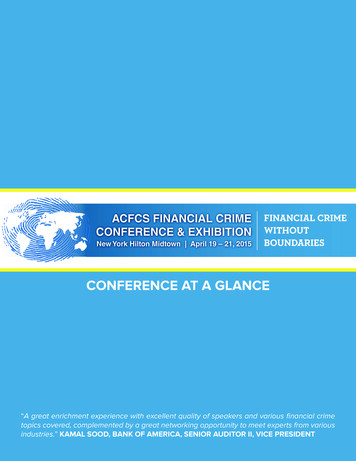
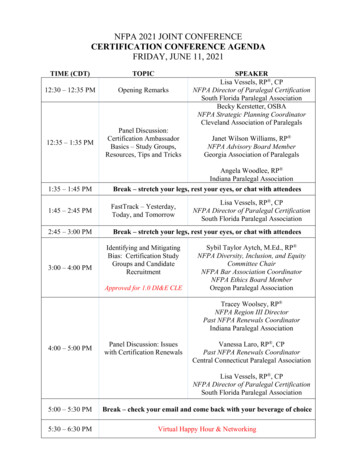
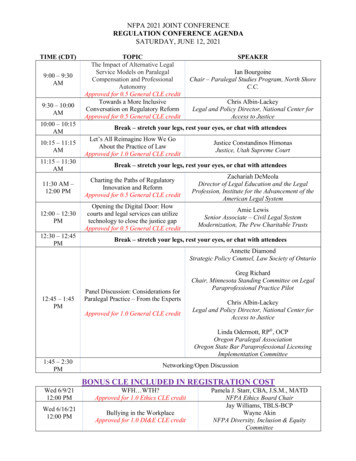



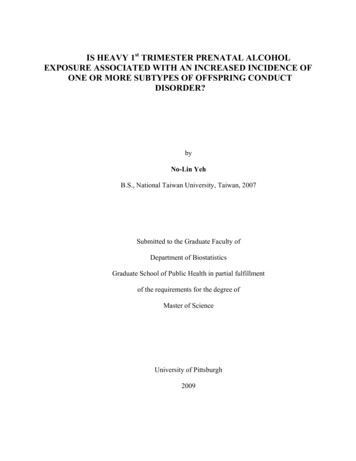
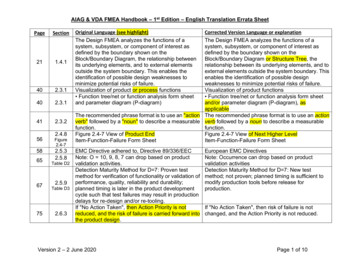
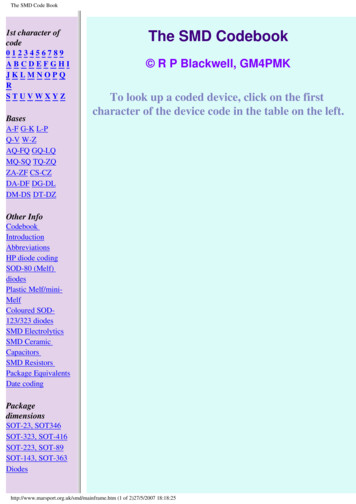
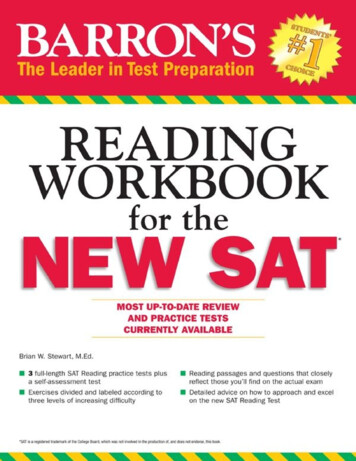

![Books/Pathfinder[Multi]/1st Edition/Campaign/Occult Realms](/img/6/occult-20realms.jpg)